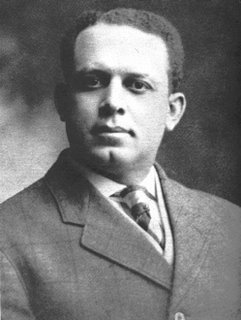
 Anna Bishop was a great friend of Hot Times, the annual music and arts festival, and also the poet laureate of the "Listen For The Jazz- Key Notes in Columbus History". Her poem: "That's Jazz" is a dedication printed on the opening page of this book that chronicles the history of Jazz in Columbus in collected oral histories, personal memories and family photo albums. Arnette Howard was a major contributor to the book. Much of the material included was culled from his extensive collection of stories and artifacts. Once again he sends us a fascinating bit of Columbus history.
Anna Bishop was a great friend of Hot Times, the annual music and arts festival, and also the poet laureate of the "Listen For The Jazz- Key Notes in Columbus History". Her poem: "That's Jazz" is a dedication printed on the opening page of this book that chronicles the history of Jazz in Columbus in collected oral histories, personal memories and family photo albums. Arnette Howard was a major contributor to the book. Much of the material included was culled from his extensive collection of stories and artifacts. Once again he sends us a fascinating bit of Columbus history.My People,
I give my greetings with a heavy heart this day; my friend Eddie Colston, Jr. died yesterday morning. Eddie was a noted painter and educator, teaching at the Martin Janis Center, part of the Columbus recreation and Parks Department. His father, Eddie Colston, Sr., was an entertainer and journalist and much of his writing and photgraphy has helped me uncover the legacy of Columbus' Black entertainers. Eddie Jr. is to be honored with a funeral mass on Saturday at St. Dominic Parish on North Twenty-five Street.
The Mother of Black History in Columbus is Anna Bishop. In addition to being an educator in Columbus schools, a singer, poet, composer, actress and tireless community activist, she was the author of Beyond Poindexter Village: The Blackberry Patch.
In 1982, the first of four parts of her writings were published by the Columbus Metropolitan Library. Beyond Poindexter Village chronicled the community that began after W.W.I when Black southerners moved north to take advantage of the industrial boom that was occurring in many midwestern cities. The Blackberry Patch was settled in East Columbus bordering Long Street, Mount Vernon Avenue, Ohio Avenue and Mink Alley.
According to the book, southerners brought strange customs and cultural patterns to Columbus. "On warm days different people came through the streets selling different things. The watermelon man drove a flat bed truck with a hand made sign that said 'Georgia.' You could hear him coming, singing, 'Watermelon, watermelons! Georgia watermelons, red, ripe, red watermelons!"
Jake and Lena, Italian immigrants, had a horse drawn wagon and they sold vegetables. The people on Champion Avenue knew what Jake meant when he called out, "Epple! Epple! Good, juicy red Epple!" All of the people in the neighborhood would run out to get fresh apples, green beans, corn and potatoes.
One man rang a bright metal hand bell as he walked along the streets and all of the children ran out to the musical sound. The scissors grinder carried a contraption on his back that was machinery for sharpening knives and scissors, screwdrivers for umbrella repairing and for fixing things. He was their science and mechanics teacher.
When the rag man called out, "Iron, rags, glass," the people in the Blackberry Patch knew they could exchange the things that they had been collecting in buckets around the neighborhood for cash. The rag man was the original recycling business.
In her four volumes Anna Bishop interviewed the golden agers, born in the south at the beginning of the century, who had the recipes that helped families survive the terrible times of the depression years of poverty. She documented the details of neighborhood business, theaters, nightclubs, transportation and personalities.
One fascinating businessman was James Albert Jackson, a successful feed merchant in the day when Columbus citizens kept small flocks of chickens in their backyards. He and his business partner, James Williams, opened the Empress Theater at 768 East Long Street in the 1920s. When a theater owner on Mount Vernon insisted on keeping Black customers out, Mr. Jackson said that he'd fix them, "I'll build a theater better than any one in the United States."
When the Ogden (Lincoln) Theater opened in 1928, the whole interior took you back to Egypt with marble pillars carved and painted to look like Egyptian antiques. The carpeting was plush and the Club Lincoln was where Sammy Stewart's Orchestra performed and little Sammy Davis, Jr. was four years old when he made his first impromptu appearance onstage.
Anna Bishop passed in 2004, but the legacy that she not only left with her active life but documented in Beyond Poindexter Village, continues to inspire me.
A
http://creolefunk.com/historical/blackhistory/blackhistory.html






2 comments:
I am Anna Bishops grand-daughter and I appreciate the support and gratitude given to my grandmother. Its amazing the support she continues to receive after her death.
To contact monicacrome@yahoo.com
I met your grandmother in the early 80s when I was involved with CAMACO and later as an organizer of the Hot Times Festival, where she served as host to our famous Listen for the Jazz band as well as official Hot Times poet laureate.
She was a very cool lady and I dug her.
Post a Comment